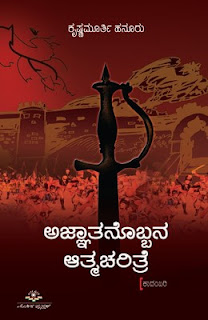 ಕೊಡುಗು ರಾಜ್ಯ
ಬ್ರಿಟಿಷರ ಕೈ ಪಾಲಾಗುವ ಮುಂಚೆ ಆಳುತ್ತಿದ್ದ ಅರಸು ಚಿಕವೀರ ರಾಜೇಂದ್ರ. ಆ ಕಾಲಘಟ್ಟದ ರಾಜಕೀಯ ಸನ್ನಿವೇಶಗಳು
ಹಾಗೆಯೆ ಕೊಡಗು ಸಮಾಜದ ರೀತಿ ರಿವಾಜುಗಳ ಸ್ಥೂಲ ಪರಿಚಯ ಈ ಪುಸ್ತಕದ ವಿಷಯ ವಸ್ತು.
ಕೊಡುಗು ರಾಜ್ಯ
ಬ್ರಿಟಿಷರ ಕೈ ಪಾಲಾಗುವ ಮುಂಚೆ ಆಳುತ್ತಿದ್ದ ಅರಸು ಚಿಕವೀರ ರಾಜೇಂದ್ರ. ಆ ಕಾಲಘಟ್ಟದ ರಾಜಕೀಯ ಸನ್ನಿವೇಶಗಳು
ಹಾಗೆಯೆ ಕೊಡಗು ಸಮಾಜದ ರೀತಿ ರಿವಾಜುಗಳ ಸ್ಥೂಲ ಪರಿಚಯ ಈ ಪುಸ್ತಕದ ವಿಷಯ ವಸ್ತು.
ಅತಿ ಮುದ್ದಿನಿಂದ ಹಾಳಾಗಿ ಬೆಳೆದ ರಾಜಕುಮಾರ ಚಿಕವೀರ ರಾಜೇಂದ್ರ. ಬಾಲ್ಯದಲ್ಲಿ ಅವನಿಗೆ ಅವನದೇ ವಯಸ್ಸಿನವನಾದ ಕುಂಟ ಬಸವನೊಂದಿಗೆ ಮಾತ್ರ ಸಲಿಗೆಯ ಗೆಳೆತನ. ಮುಂದೆ ರಾಜನಾದ ಮೇಲೂ ಅವನನ್ನೇ ಮಂತ್ರಿಯಾಗಿಸಿಕೊಳ್ಳುತ್ತಾನೆ. ಆದರೆ ಅವನ ಕೆಲಸವೇನಿದ್ದರೂ ರಾಜನ ದೈಹಿಕ ಅಪೇಕ್ಷೆಗಳ ಏರ್ಪಾಡು ಮಾಡುವುದು. ರಾಜ್ಯ ಆಡಳಿತ ಎಲ್ಲ ಇನ್ನಿಬ್ಬರು ಮಂತ್ರಿಗಳಾದ ಬೋಪಣ್ಣ ಮತ್ತು ಲಕ್ಷ್ಮೀನಾರಾಯಣಯ್ಯನವರದು. ರಾಜ ಮಾತ್ರ ಕ್ರೂರಿಯಾಗಿ ನಡೆದುಕೊಳ್ಳುತ್ತ, ಬೊಕ್ಕಸ ಬರಿದು ಮಾಡುವುದರಲ್ಲೇ ಮಗ್ನ. ಹಾಗಾಗಿಯೇ ಜನ ಸಾಮಾನ್ಯರಿಗೆ ತಮ್ಮ ರಾಜನನ್ನು ಇಷ್ಟ ಪಡುವುದಕ್ಕೆ ಯಾವ ಕಾರಣವೂ ಇರಲಿಲ್ಲ. ಆದರೆ ಇದಕ್ಕೆ ಅಪವಾದ ಎಂಬಂತೆ ರಾಣಿಯು ಜನಹಿತ ಕಾಪಾಡುವುದರಲ್ಲಿ ಆಸಕ್ತಿ ತೋರಿಸಿ, ತಪ್ಪುಗಳನ್ನು ಸರಿ ಪಡಿಸುತ್ತ, ಸಮತೋಲನದ ಪ್ರಯತ್ನ ಮಾಡುತ್ತಿದ್ದಳು.
ರಾಜನ ಸೋದರಿ
ದೇವಮ್ಮಾಜಿ ಮತ್ತು ಅವಳ ಗಂಡ ಚನ್ನಬಸವಯ್ಯನಿಗೆ, ರಾಜನ್ನು ಕೆಳಗಿಳಿಸಿ, ರಾಜ್ಯದ ಅಧಿಕಾರ ತಮ್ಮ ಕೈ
ವಶ ಮಾಡಿಕೊಳ್ಳುವ ಆಸೆ. ರಾಜನಿಗೆ ಇವರ ಸಂಚಿನ ಅರಿವಾಗಿ, ತನ್ನ ಸೋದರಿಯನ್ನು ಬಂಧನದಲ್ಲಿಡುತ್ತಾನೆ.
ನಂತರ ರಾಣಿ ಹಾಗೂ ಜ್ಯೋತಿಷಿಯ ಸಲಹೆಯ ಮೇರೆಗೆ ಅವಳನ್ನು ಬಿಡುಗಡೆಗೊಳಿಸುತ್ತಾನೆ. ಮುಂದೆ ದೇವಮ್ಮಾಜಿಗೆ
ಮಗನ ಜನನವಾಗುತ್ತದೆ. ಆ ಸಂದರ್ಭದಲ್ಲಿ ಅವಳ ಗಂಡ ಚನ್ನಬಸವಯ್ಯ
ಅಲ್ಲಿಂದ ಪಾರಾಗಿ, ಬ್ರಿಟಿಷರ ಸಹಾಯ ಪಡೆದುಕೊಂಡು ರಾಜ್ಯವನ್ನು ವಶ ಪಡಿಸಿಕೊಳ್ಳುವ ಉಪಾಯ ಮಾಡುತ್ತಾನೆ.
ಆದರೆ ಉಪಾಯವನ್ನು ಕಾರ್ಯಗತಗೊಳಿಸುವ ಆತುರದಲ್ಲಿ, ಅವರ ಮಗುವು ರಾಜೇಂದ್ರನ ಕೈ ವಶವಾಗುತ್ತದೆ. ಆಗ
ಬ್ರಿಟಿಷರು ಪರಿಸ್ಥಿತಿಯ ಲಾಭ ಪಡೆಯಲು ಮಧ್ಯೆ ಬಂದು, ಮಗುವನ್ನು ಅವರ ತಂದೆ ತಾಯಿಯ ವಶಕ್ಕೆ ಒಪ್ಪಿಸುವಂತೆ
ರಾಜೇಂದ್ರನಿಗೆ ಪತ್ರ ಬರೆಯುತ್ತಾರೆ. ಇದಕ್ಕೆ ಒಪ್ಪದ ರಾಜ, ಮತಿಗೆಟ್ಟು ಆ ಮಗುವನ್ನು ಸಾಯಿಸಿ ಬಿಡುತ್ತಾನೆ.
ಈ ಘಟನೆ ಜನರನ್ನು ರೊಚ್ಚಿಗೆಬ್ಬಿಸಿ, ದಂಗೆಯೇಳುವಂತೆ ಮಾಡುತ್ತದೆ. ಅವಕಾಶವಾದಿಗಳಾದ ಬ್ರಿಟಿಷರು ಇದೆ
ಸಮಯಕ್ಕೆ ತಮ್ಮ ಸೇನೆಯ ಸಮೇತ ಬಂದು, ಕೊಡಗನ್ನು ವಶ ಪಡಿಸಿಕೊಂಡು, ತಮ್ಮ ಆಡಳಿತಕ್ಕೆ ಒಳ ಪಡಿಸುತ್ತಾರೆ.
ಅಧಿಕಾರ ಕಳೆದುಕೊಂಡು,
ಗಡಿ ಪಾರಾದ ರಾಜೇಂದ್ರನ ಜೀವನ ಬ್ರಿಟಿಷರು ಕೊಡುವ ಪರಿಹಾರ ಧನದೊಂದಿಗೆ ಮುಂದುವರೆಯುತ್ತದೆ. ಅವನ ಪತ್ನಿಯು
ತೀರ್ಥಯಾತ್ರೆಯ ದಾರಿಯಲ್ಲಿ ಸಾವನ್ನಪ್ಪುತ್ತಾಳೆ. ಮತ್ತು ಅವನ ಮಗಳು ಬ್ರಿಟಿಷ್ ಅಧಿಕಾರಿಯನ್ನು ಮದುವೆಯಾಗಿ
ಲಂಡನ್ ಗೆ ತೆರಳುತ್ತಾಳೆ.
ಇದು ಈ ಪುಸ್ತಕದ
ಕಿರು ಪರಿಚಯ ಮಾತ್ರ. ಇನ್ನೂ ಸಾಕಷ್ಟು ಪಾತ್ರಗಳ ಮತ್ತು ವಿಷಯಗಳ ಸವಿಸ್ತಾರ ಅರಿವಿಗೆ ನೀವು ಈ ಪುಸ್ತಕವನ್ನೇ
ಓದಬೇಕು.








